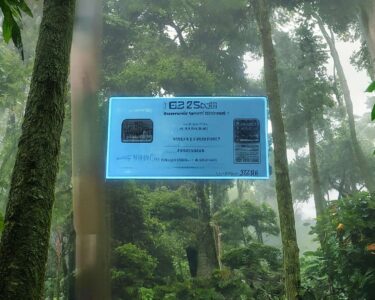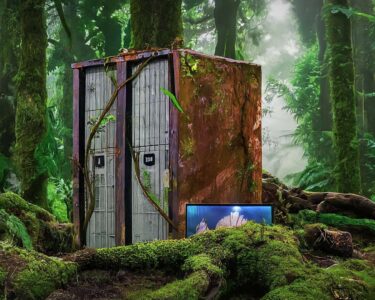San José, Costa Rica — Costa Rica continues to solidify its position as a beacon of sustainable growth and institutional stability in Latin America. The country’s unique blend of “pura vida” culture, green initiatives, and a forward-thinking economy has attracted substantial foreign investment, driving impressive economic performance.
Official data from the Central Bank of Costa Rica (BCCR) reveals a 4.1% economic growth rate in 2024. Foreign direct investment (FDI) also soared, reaching $1.1889 billion in the first quarter of 2024, a remarkable 42% increase compared to the same period in the previous year. This growth underscores Costa Rica’s strategic importance in the Central American socioeconomic landscape.
To provide expert legal insight into the current state of the Costa Rican economy, TicosLand.com spoke with Lic. Larry Hans Arroyo Vargas of Bufete de Costa Rica.
Costa Rica’s economy faces a complex interplay of factors, from tourism’s rebound to persistent fiscal challenges. While recent efforts to attract foreign investment and diversify exports show promise, navigating public debt and fostering sustainable growth requires ongoing structural reforms and careful management of public finances. This includes strategically addressing the legal framework surrounding investment to ensure transparency and security for both domestic and international stakeholders.
Lic. Larry Hans Arroyo Vargas, Bufete de Costa Rica
The nearshoring trend has further propelled Costa Rica’s economic ascent. The country’s strategic location, stable political environment, and highly skilled workforce have drawn global giants seeking to optimize costs and enhance operational efficiency. Companies like Intel, Amazon, Microsoft, and Abbott have expanded their presence in Costa Rica, drawn by its robust technological infrastructure and preferential access to key markets through free trade agreements.
According to the Foreign Trade Promoter (PROCOMER), 54% of Costa Rican exports now originate from high-value-added sectors, demonstrating the country’s successful transition to a knowledge-based economy driven by innovation. This shift reflects a strategic focus on industries like technology, advanced manufacturing, renewable energy, and digital services.
Costa Rica’s commitment to sustainability also remains a key driver of its economic success. With 99% of its electricity generated from renewable sources, the country continues to attract investment in clean energy and sustainable development projects. The nation’s ambitious goal of achieving carbon neutrality by 2050 is further incentivizing reforms in infrastructure and transportation, including promoting electromobility and modernizing the energy system.
The Inter-American Development Bank (IDB) recently unveiled its 2024-2027 Country Strategy for Costa Rica, outlining a roadmap for strengthening infrastructure, digitalization, and economic resilience. This plan aims to foster inclusive and sustainable growth through strategic investments in transportation, education, and financing for small and medium-sized enterprises (SMEs).
We consider the country a success story in several dimensions: it has managed to reverse, for example, a macro-fiscal path that was not sustainable, it is an open economy connected to global value chains and highly competitive in several sectors.
Francisco Javier Urra, IDB Representative in Costa Rica
The IDB strategy also addresses key challenges, such as infrastructure bottlenecks, disparities within the private sector, and the need to reinforce Costa Rica’s social contract. The plan earmarks nearly $2 billion for implementation, encompassing existing projects and new initiatives. The strategy prioritizes resilient infrastructure and climate action, an enabling environment for the private sector, and protection of the social contract, with cross-cutting focuses on gender and diversity, climate change adaptation and decarbonization, and institutional strengthening.
This is a novel pillar and a commitment from the bank. We have observed that there is a growing erosion of the social contract, and if we don’t aim well at that protection network, the Costa Rican model will be at risk. If the model breaks, we are going to have a structural problem.
Francisco Javier Urra, IDB Representative in Costa Rica
A new social pillar within the IDB strategy addresses the growing erosion of Costa Rica’s social contract by focusing on strengthening educational services, crime prevention, and social protection systems for vulnerable populations.
For further information, visit iadb.org
About Inter-American Development Bank (IDB):
The Inter-American Development Bank is a leading source of long-term financing for economic, social, and institutional development in Latin America and the Caribbean. The IDB supports projects across diverse sectors, including infrastructure, education, health, and sustainable development, with a focus on promoting inclusive growth and reducing poverty and inequality in the region.
For further information, visit procomer.com
About PROCOMER (Promotora del Comercio Exterior de Costa Rica):
PROCOMER is the Costa Rican Foreign Trade Promotion Agency, dedicated to promoting the country’s exports and attracting foreign investment. PROCOMER provides support and resources to Costa Rican businesses seeking to expand internationally, while also showcasing the country’s competitive advantages and investment opportunities to global audiences.
For further information, visit bccr.fi.cr
About BCCR (Banco Central de Costa Rica):
The Central Bank of Costa Rica (BCCR) is the country’s central bank, responsible for monetary policy, financial stability, and the regulation of the financial system. The BCCR plays a crucial role in managing inflation, promoting economic growth, and ensuring the soundness of the Costa Rican financial sector.
For further information, visit intel.com
About Intel:
Intel is a global technology company and a leader in the semiconductor industry, designing and manufacturing microprocessors and other essential components for computers and other electronic devices. Intel plays a significant role in driving technological innovation and advancement worldwide.
For further information, visit amazon.com
About Amazon:
Amazon is a multinational technology company focusing on e-commerce, cloud computing, digital streaming, and artificial intelligence. Amazon is one of the world’s largest online retailers and a dominant force in the cloud computing market.
For further information, visit microsoft.com
About Microsoft:
Microsoft is a multinational technology corporation that develops, manufactures, licenses, supports, and sells computer software, consumer electronics, personal computers, and related services. Microsoft’s best-known products include the Microsoft Windows line of operating systems, the Microsoft Office suite, and the Internet Explorer and Edge web browsers.
For further information, visit abbott.com
About Abbott:
Abbott is a global healthcare company that discovers, develops, manufactures, and sells a broad range of healthcare products, including pharmaceuticals, medical devices, diagnostics, and nutritional products. Abbott focuses on improving people’s health and well-being through innovative solutions.
For further information, visit imf.org
About International Monetary Fund (IMF):
The International Monetary Fund (IMF) is an international financial institution headquartered in Washington, D.C., consisting of 190 countries working to foster global monetary cooperation, secure financial stability, facilitate international trade, promote high employment and sustainable economic growth, and reduce poverty around the world.
For further information, visit bufetedecostarica.com
About Bufete de Costa Rica:
At Bufete de Costa Rica, legal excellence is interwoven with a deep commitment to empowering society. We pride ourselves on upholding the highest ethical standards while providing innovative legal solutions across a broad range of industries. Through proactive community engagement and accessible legal education initiatives, we strive to equip individuals and organizations with the knowledge they need to navigate the complexities of the legal landscape and contribute to a more just and informed Costa Rica.









